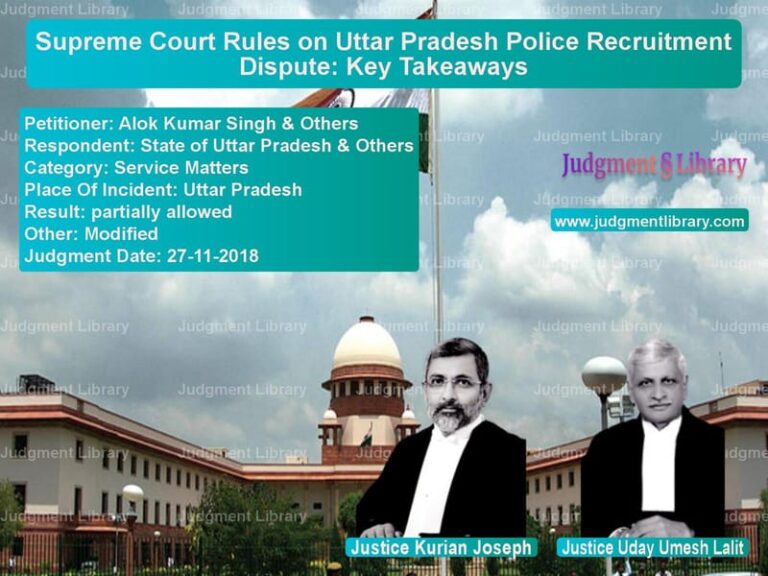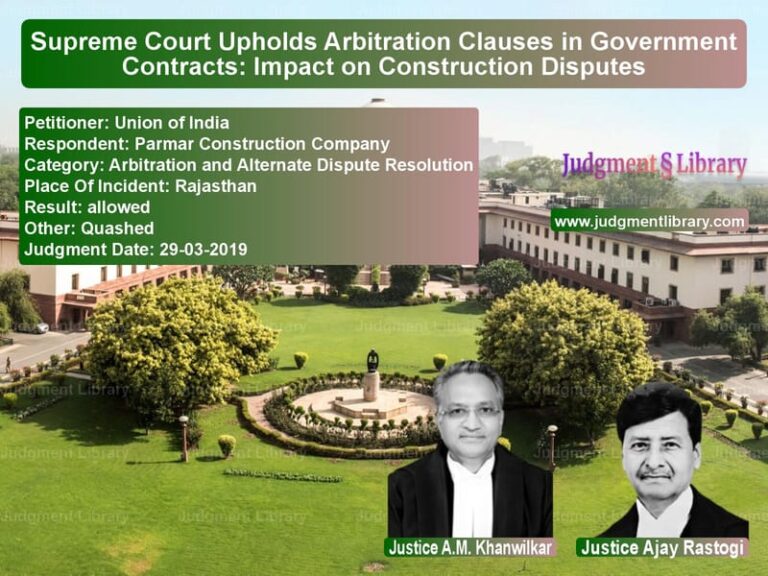POCSO Act and Age Determination: Supreme Court Acquits Appellant in Child Sexual Offence Case
The Supreme Court of India recently delivered a landmark judgment in the case of P. Yuvaprakash v. State Rep. by Inspector of Police, which raised significant legal questions concerning the Protection of Children from Sexual Offences Act, 2012 (POCSO Act). The appellant, P. Yuvaprakash, had been convicted under Section 6 of the POCSO Act for allegedly having a sexual relationship with a minor girl. The trial court sentenced him to life imprisonment, which was later reduced to ten years by the Madras High Court. However, the Supreme Court ultimately acquitted him, emphasizing the importance of proper age determination in POCSO cases.
The case highlights the critical need for precise documentation and legally valid evidence in age determination, particularly when the prosecution relies on school records that may not meet the legal standards for proving age. The judgment reaffirms that where doubts exist, ossification tests and medical evidence must be given due consideration. This case serves as a crucial precedent in defining the evidentiary requirements for POCSO-related convictions.
Background of the Case
The case originated when the victim’s father, T. Abdul Hameed, lodged a complaint against the appellant, alleging that his 17-year-old daughter had been kidnapped by the appellant and two other individuals while she was returning home from a hospital visit. The complaint was initially registered under Section 366A of the Indian Penal Code (IPC) for kidnapping. The prosecution further alleged that the appellant took the victim to a temple and forcibly married her before engaging in repeated sexual intercourse.
The victim later returned to her father’s house and reported to the police that she had eloped willingly and had been in a relationship with the appellant for over a year. Despite this, the police altered the charges to include Section 6 of the POCSO Act, which deals with aggravated penetrative sexual assault, along with provisions from the Child Marriage Prohibition Act, 2006.
Key Issues Before the Court
- Whether the victim was a minor at the time of the alleged offence.
- Whether the relationship between the victim and the appellant was consensual.
- Whether the prosecution had provided conclusive proof of the victim’s age.
- Whether the appellant could be convicted under the POCSO Act despite conflicting statements from the victim.
Arguments of the Petitioner
The appellant’s counsel, Ms. E.R. Sumathy, raised multiple contentions challenging the findings of the lower courts:
- The victim’s statement under Section 164 of the Criminal Procedure Code (CrPC) clearly indicated that she had voluntarily eloped with the appellant.
- The prosecution failed to provide valid proof that the victim was under 18 years of age at the time of the incident.
- The ossification test, conducted by medical experts, placed the victim’s age between 18 and 20 years.
- The school transfer certificate presented by the prosecution did not satisfy the statutory requirements under the Juvenile Justice (Care and Protection of Children) Act, 2015 (JJ Act) for age determination.
- The victim’s own statements revealed that she had attempted suicide previously due to family objections to her relationship with the appellant, indicating that she was not coerced into marriage.
Arguments of the Respondent
The prosecution, represented by Mr. V. Krishnamurthy, Additional Advocate General, defended the conviction on the following grounds:
- The victim was a minor, and her consent was legally irrelevant under the POCSO Act.
- The school records showed the victim’s date of birth as July 11, 1997, making her below 18 years of age at the time of the incident.
- The testimony of the victim’s father and other witnesses supported the allegations of kidnapping and forced marriage.
- The medical examination showed that the victim had engaged in sexual activity, reinforcing the charges under the POCSO Act.
Legal Analysis by the Supreme Court
The Supreme Court scrutinized the prosecution’s evidence, particularly the age determination of the victim. It referred to Section 34 of the POCSO Act and Section 94 of the JJ Act, which provide a hierarchy of documents for establishing age:
- The birth certificate issued by a municipal authority.
- The matriculation or equivalent certificate from a recognized educational board.
- Only in the absence of the above, an ossification test or other medical examination can be considered.
The Court observed that the prosecution had relied solely on a school transfer certificate, which did not fulfill the statutory requirement. On the other hand, the medical evidence, including an ossification test, indicated that the victim was likely over 18 years of age.
The Court stated:
“Since the prosecution failed to establish that the victim was below 18 years, the appellant’s conviction under the POCSO Act cannot be sustained. The school records presented did not meet the legal threshold for age determination under Section 94 of the JJ Act.”
Impact of the Judgment
The Supreme Court’s ruling in this case sets a vital precedent for cases involving the POCSO Act and the age determination of victims. It underscores that:
- Prosecution must provide legally admissible proof of age.
- School transfer certificates alone are insufficient if other more conclusive documents are absent.
- Ossification tests and medical examinations should be considered in cases where documentary evidence is inconclusive.
Final Verdict
The Supreme Court acquitted the appellant, stating that there was no conclusive evidence to prove the victim was a minor. The judgment set aside the lower court’s conviction under the POCSO Act and directed the immediate release of the appellant.
This ruling reinforces the importance of following statutory guidelines for age determination and ensures that wrongful convictions do not occur due to procedural lapses.
Petitioner Name: P. Yuvaprakash.
Respondent Name: State Rep. by Inspector of Police.
Judgment By: Justice S. Ravindra Bhat, Justice Aravind Kumar.
Place Of Incident: Erode, Tamil Nadu.
Judgment Date: 18-07-2023.
Don’t miss out on the full details! Download the complete judgment in PDF format below and gain valuable insights instantly!
Download Judgment: p.-yuvaprakash-vs-state-rep.-by-inspec-supreme-court-of-india-judgment-dated-18-07-2023.pdf
Directly Download Judgment: Directly download this Judgment
See all petitions in Juvenile Justice
See all petitions in Bail and Anticipatory Bail
See all petitions in SC/ST Act Case
See all petitions in Fraud and Forgery
See all petitions in Judgment by S Ravindra Bhat
See all petitions in Judgment by Aravind Kumar
See all petitions in allowed
See all petitions in supreme court of India judgments July 2023
See all petitions in 2023 judgments
See all posts in Criminal Cases Category
See all allowed petitions in Criminal Cases Category
See all Dismissed petitions in Criminal Cases Category
See all partially allowed petitions in Criminal Cases Category







